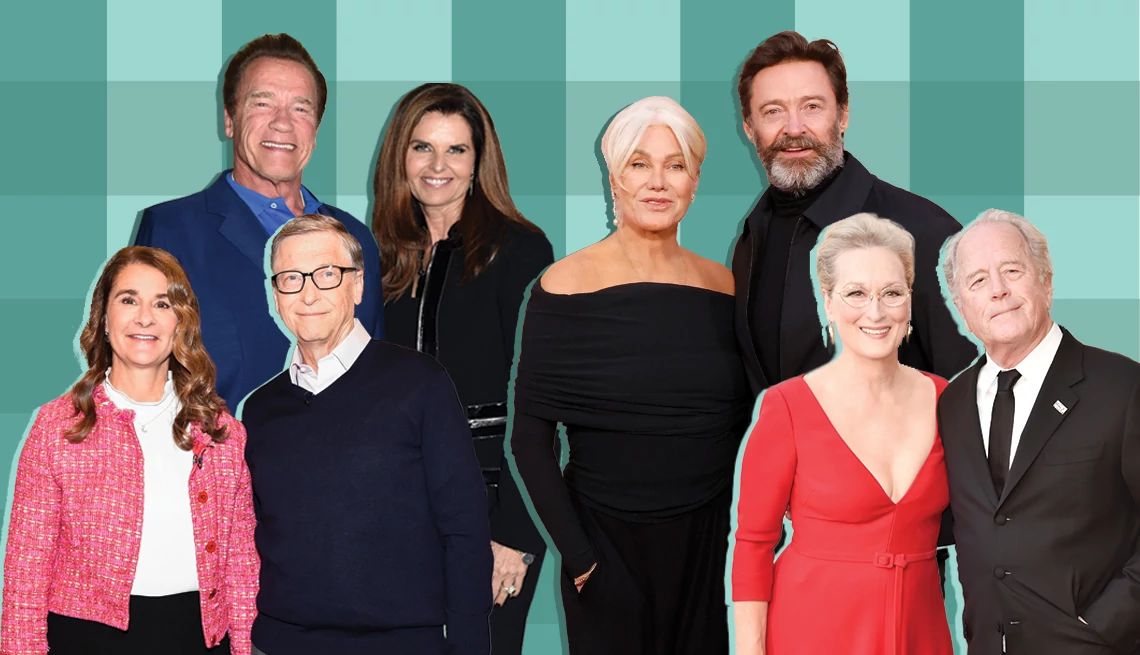AARP Hearing Center


There's a long list of older celebrity couples who have split after decades together: Nicole Kidman and Keith Urban, married 19 years; Hugh Jackman and Deborra-Lee Furness, married 27 years; Meryl Streep and Don Gummer, married 39 years; Arnold Schwarzenegger and Maria Shriver, married 25 years; Bill and Melinda Gates, married 27 years.
But it's not just celebrities. Gray divorce across the U.S. is significantly more common than it was a generation ago. More than one in three people who divorce in the U.S. are older than 50, according to research published in 2022 in the Journals of Gerontology: Series B. And many of those are, just like in Hollywood, people who have been together a long, long time.
So why go your separate ways after building a life together? Here are 10 big reasons, according to experts.
1. Infidelity
Suzy Brown, 78, says she tried for "three long, agonizing years" to persuade her husband to break off an affair with somebody he’d met at work. But ultimately, after 33 years of marriage, she filed for divorce.
Brown, of Kansas City, Missouri, says she was devastated, hurt, sad and furious. She found herself doing things she never would have expected, such as hiding behind bushes in the parking lot across from her former spouse’s new apartment at 2 a.m. to see if the woman was there.
Why cheat in a long-term marriage? It's often because life seems easier with someone other than your spouse. "The affair partner doesn't make the same demands on their partner that a spouse does," says Rachel Mirsky, a Certified Divorce Coach in Rochester, New York, adding that the person they are having an affair with usually doesn’t ask them to do chores, isn't financially dependent on them and doesn't rely on them for all of the regular responsibilities that go with day-to-day life.
The good news: Many people handle the experience by reinventing themselves, Mirsky says.
Brown used her experience to start a website with information to help others going through divorce called Midlife Divorce Recovery and wrote a book, Radical Recovery: Transforming the Despair of Your Divorce Into an Unexpected Good.
2. Money issues
For many older adults, worrying over money is warranted. The National Council on Aging found that 80 percent of Americans 60 and up don't have sufficient funds for financial emergencies.
But conflict in a marriage over money is not always about how much money a couple has, says Karen Covy, a divorce coach and divorce attorney in Chicago. People "want what money means to them. There’s a whole emotional component to it."
A classic example is the spender versus the saver, says Mirsky. For the spender, money equals freedom; for the saver, it represents security. Spenders may view savers as frugal or miserly, and savers may view spenders as frivolous or wasteful.
"Many times, only one of the spouses handles the family finances, and they often feel that the other spouse doesn't appreciate the amount of expenses they have, or how much they truly need to save to be prepared for retirement."
Another common source of money conflict, says Covy, is when one partner agrees to stay home with the kids while the other supports the family financially. After the children are grown, though, the financial supporter often wants the stay-at-home spouse to enter or return to the workforce, but that spouse may be unable or unwilling to find outside work.
"Both spouses have different perspectives about the deal and who broke it," Covy says. "This is why you have to deal with issues as they come up, because the longer you let them go, the more resentment builds. There comes a tipping point, and if one spouse lets the other go over their tipping point, game over."
3. Bad communication
There's poor communication, and then there’s harmful communication. The Gottman Institute, which has studied couples’ behavior since the mid-1990s, uses the Four Horsemen of the Apocalypse as a metaphor for the communication styles that, according to the institute’s research, can predict the end of a relationship: criticism, contempt (the No. 1 predictor of divorce), defensiveness and stonewalling.
Mirsky breaks down how each one can harm a long-term relationship:
- Criticism: "Especially for people that need positive affirmation from their spouse to feel loved, criticism can destroy a critical need for a successful relationship."
- Contempt: "When spouses continually speak with contempt to one another, they destroy the feelings of closeness and safety that are paramount to successful relationships."
- Defensiveness: "When partners get defensive with one another, it is often about something deeper than the argument itself."
- Stonewalling: "One partner stonewalls the other, they are refusing to engage in the conversation and thus preventing any real chance at true understanding of their spouse and their needs."


































































You Might Also Like
Essay: I'm Skipping New Year's Resolutions and Doing This Instead
After years of failing to keep up her January resolutions, this writer is taking a new, foolproof approach to self-improvement for 2025
At 105, Virginia Hislop Got Her Master’s Degree in Education
Although gardening and playing bridge with friends are at the top of her to-do list, she never lost her love of learning
Top Things Women Over 60 Ask About Sex
A few of these are sure to surprise you